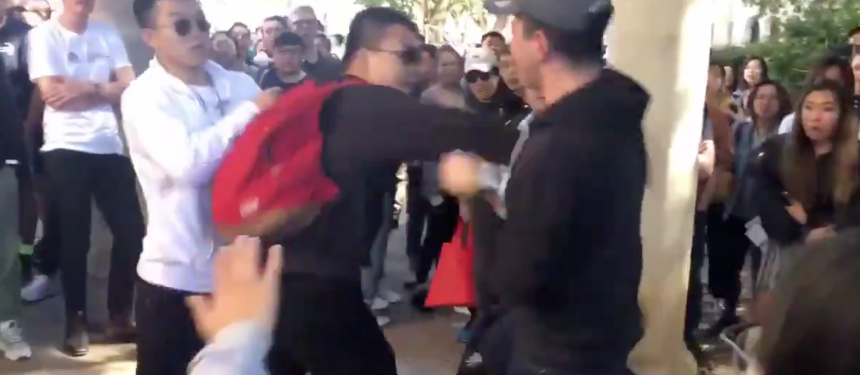A series of incidents in Australia and New Zealand, started after a protest against Hong Kong’s extradition laws turned violent at the University of Queensland’s St Lucia campus in Brisbane, has brought concerns of Chinese-influence on university campuses back into focus.
News and business analysis for Professionals in International Education
Have some pie!
ANZ: Concerns mount over Chinese-influence on uni campuses
 Video capturing the violence at the UQ protest. Photo: Drew Pavlou/Twitter
Video capturing the violence at the UQ protest. Photo: Drew Pavlou/Twitter As well as violence at UQ, reports indicate contracts between Australian universities and Chinese government-funded Confucius Institutes may contravene foreign influence laws, while a similar incident was reported at the University of Auckland.
“We need to be able to disagree well, and allow our staff and students to feel safe”
Held during UQ’s market day, the initial protest on 24 July was organised by Hong Kong international students with the participation of Australian domestic students in front of the university’s Confucius Institute.
During the protest, pro-Beijing supporters, identified as Chinese international students, arrived to counter and violence broke out after a pro-Beijing student took a megaphone from a pro-Hong Kong leader, resulting in kicks and punches thrown, drinks poured over protestors and the playing of the Chinese national anthem.
The moment the first attack took place at UQ. A CCP thug ripped the speaker from my hands in an attempt to intimidate me. This vid show conclusively that CCP students initiated the violence. @Rory_Medcalf @geoff_p_wade @damiencave @latingle @alexjoske @fergushunter #uqprotest pic.twitter.com/87aYqnUGPW
— Drew Pavlou (@DrewPavlou) July 26, 2019
According to witnesses, pro-Hong Kong protestors numbered around 150-200, while pro-Beijing protestors came to between 300 and 500.
In a statement, UQ spoke out against the event, saying it had zero tolerance for violence on campus.
“We need to be able to disagree well, and allow our staff and students to feel safe in expressing their own views,” the university said.
“When this takes on a character that puts our people at risk, the university will step in and take the necessary action.”
The UQ protest was immediately followed by reports from the Sydney Morning Herald that contracts between Australian universities and Confucius Institutes required universities to “accept the assessment of the [Confucius Institute] Headquarters on the teaching quality”.
The revelation, which potentially contravenes the 2018 foreign influence laws, has renewed questions over overseas interference on university campuses.
“The Australian government expects our universities to have robust mechanisms in place to ensure international education partnerships comply with Australian laws, education quality standards and academic freedoms,” education minister Dan Tehan said.
“I will be meeting with vice-chancellors in early August and have placed this issue on the agenda for that meeting.”
Tehan added that the Attorney-General, who has been responsible for the foreign influence laws, had asked his department to specifically examine arrangements to ensure compliance with the Foreign Influence Transparency Scheme.
“The Australian government expects our universities to… comply with Australian laws”
In a statement, Universities Australia said it was also looking into its members’ compliance after amendments were made in April.
“In line with Australian Government policy, our nation’s universities are looking carefully at their agreements with foreign entities to ensure they comply with the new laws.”
“Australia’s universities also strongly uphold their institutional autonomy and control of curriculum and standards.”
The Confucius Institute arrangements prompted further protests at UQ on 31 July.
A similar incident was also reported at the University of Auckland on 29 July, in which a female student pinning a message to a Lennon Wall was allegedly pushed to the ground by three male students.
“The university has been advised of recent disagreements and disputes on campus between students who have different views of the events in Hong Kong,” the university said.
“We are in touch with the students who have been involved and a formal investigation is underway following a video and notifications sent to the vice-chancellor and other senior members of the university.”
In a statement on 31 August, the Chinese consulate-general in Auckland said it appreciated the “spontaneous patriotism,” and that the situation in Hong Kong was being used to smear the reputation of China under the pretext of “academic freedom and freedom of expression.”
Still looking? Find by category:


